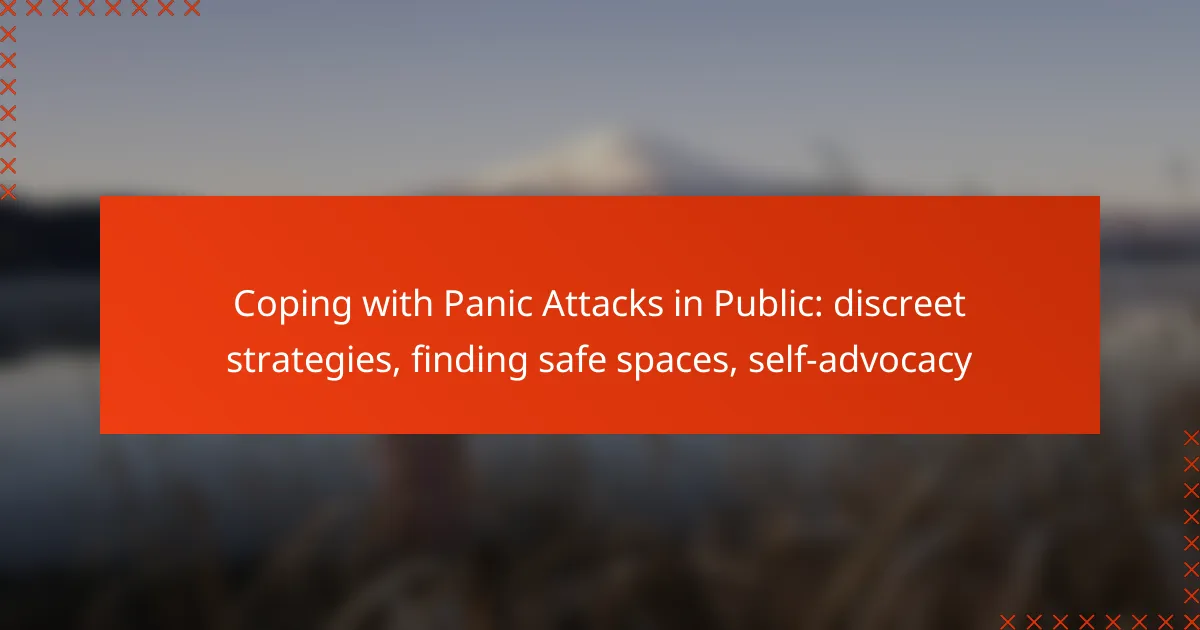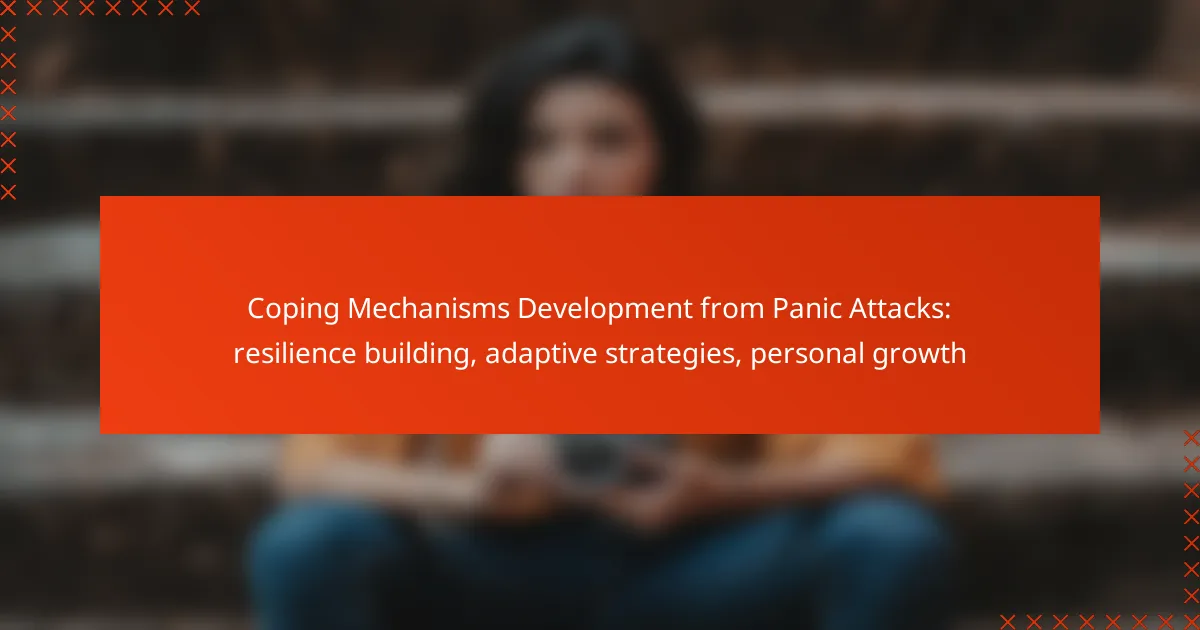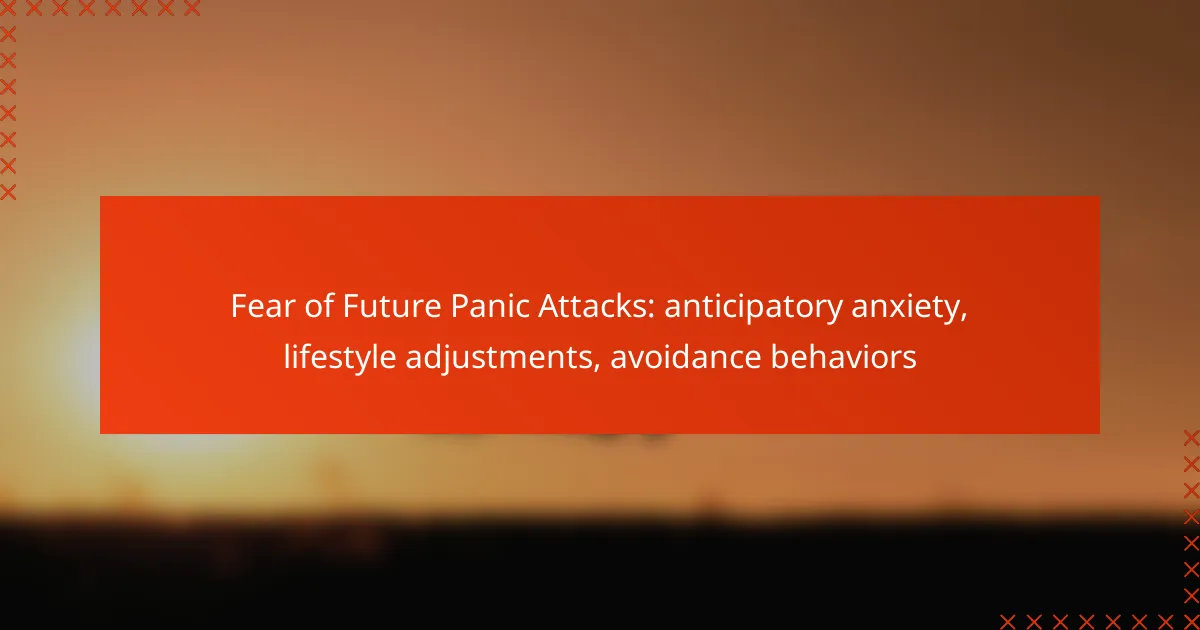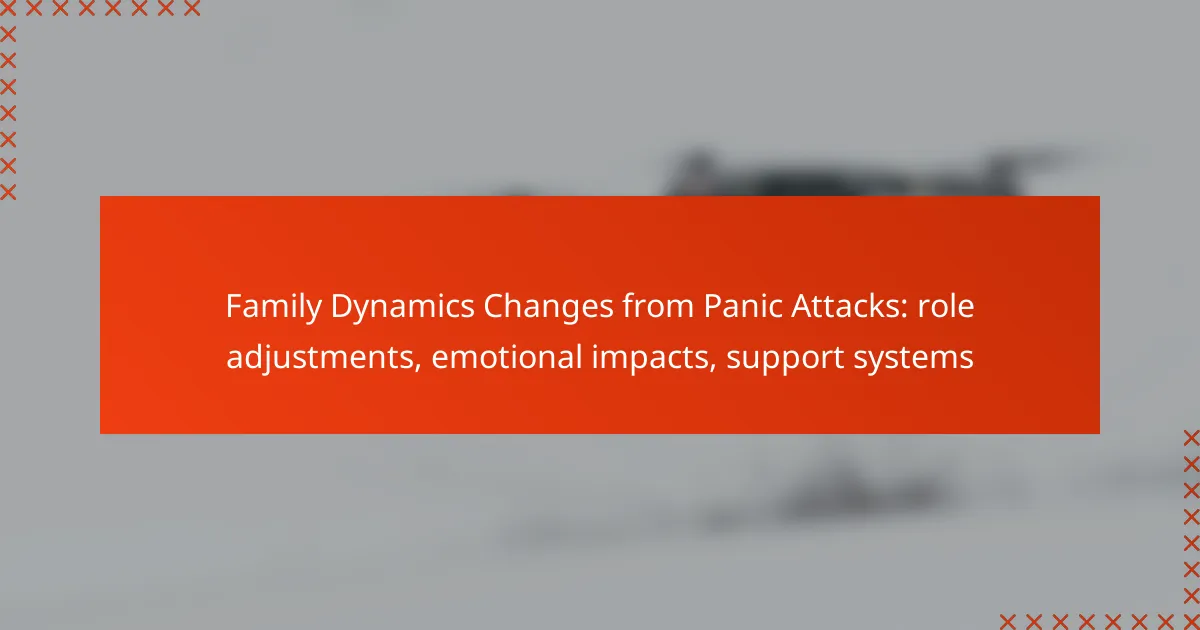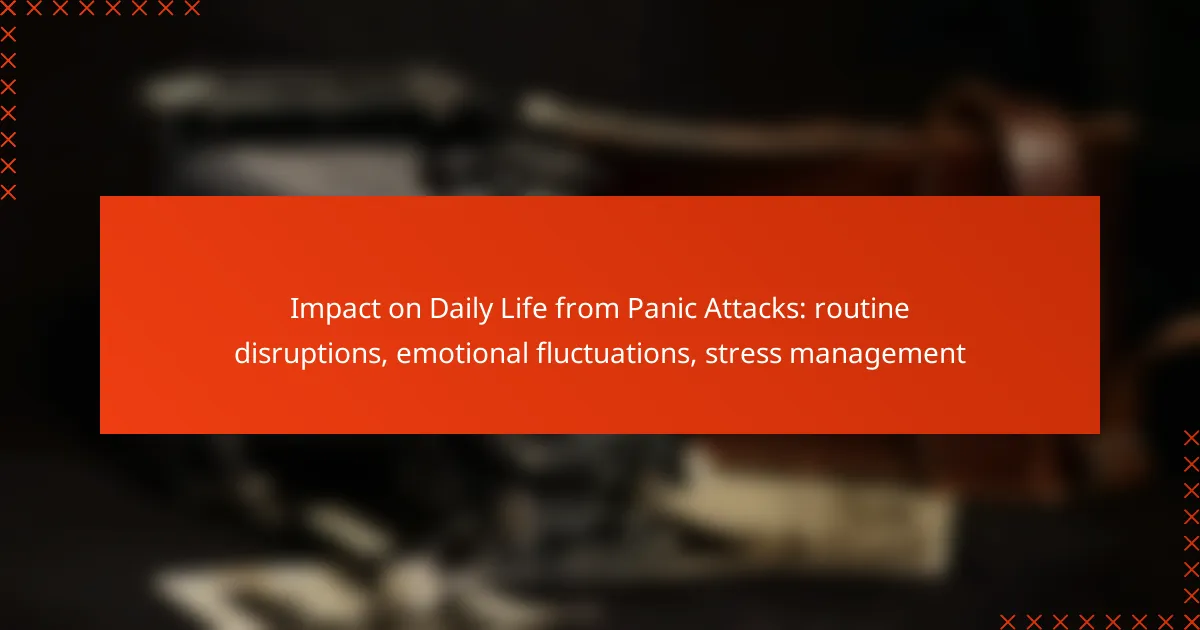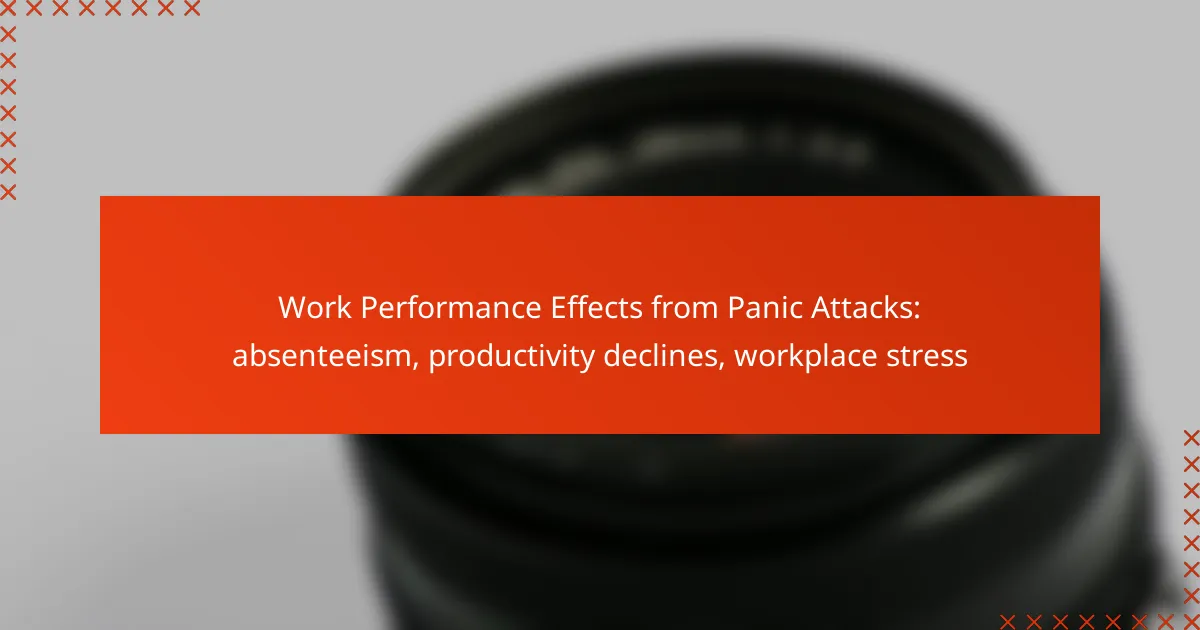What are the long-term effects of panic attacks?
The long-term effects of panic attacks can significantly impact an individual’s mental and physical health. These effects often manifest in various ways, including increased anxiety disorders, chronic stress responses, and changes in social behavior.
Increased anxiety disorders
Experiencing panic attacks can lead to the development of additional anxiety disorders, such as generalized anxiety disorder or social anxiety disorder. The fear of having another panic attack may cause individuals to avoid certain situations, further exacerbating anxiety levels.
Over time, this avoidance can create a cycle where anxiety becomes more pervasive, leading to heightened distress and impaired daily functioning. Seeking professional help early can mitigate these effects and promote healthier coping strategies.
Chronic stress response
Panic attacks can trigger a chronic stress response in the body, leading to elevated levels of cortisol and other stress hormones. This prolonged state of stress can result in various health issues, including fatigue, irritability, and sleep disturbances.
Managing stress through techniques such as mindfulness, regular exercise, and adequate sleep can help counteract these long-term effects. Individuals should consider integrating stress-reduction practices into their daily routines.
Impact on physical health
The physical health consequences of repeated panic attacks can be significant. Individuals may experience symptoms like heart palpitations, shortness of breath, and gastrointestinal issues, which can persist even after the panic attacks subside.
Long-term exposure to stress and anxiety can also contribute to cardiovascular problems and weakened immune function. Regular check-ups with healthcare providers are essential to monitor and address any emerging health concerns.
Social withdrawal
Panic attacks can lead to social withdrawal, as individuals may start avoiding places or situations where they fear an attack might occur. This isolation can strain relationships and reduce social support, which is crucial for emotional well-being.
Engaging in social activities, even in small doses, can help combat feelings of loneliness and improve mental health. Support groups or therapy can also provide a safe space for individuals to share experiences and reconnect with others.
Changes in brain function
Research suggests that repeated panic attacks can alter brain function, particularly in areas related to fear and anxiety regulation. These changes may make individuals more susceptible to anxiety disorders and affect their ability to cope with stress.
Neuroplasticity allows the brain to adapt, so engaging in cognitive-behavioral therapy or mindfulness practices can help rewire these pathways and improve emotional resilience over time.
How can panic attacks be managed long-term?
Long-term management of panic attacks often involves a combination of therapies, medications, and lifestyle changes. Effective strategies can significantly reduce the frequency and intensity of panic attacks, improving overall quality of life.
Cognitive-behavioral therapy
Cognitive-behavioral therapy (CBT) is a widely used approach for managing panic attacks. It focuses on identifying and changing negative thought patterns and behaviors that contribute to anxiety. Through structured sessions, individuals learn coping strategies to handle panic symptoms and reduce avoidance behaviors.
CBT typically involves 12 to 20 sessions, where techniques such as exposure therapy and cognitive restructuring are employed. Many find that regular practice of these skills leads to lasting improvements in anxiety management.
Medication options
Medication can be an effective component of long-term panic attack management. Common options include selective serotonin reuptake inhibitors (SSRIs) and benzodiazepines, which can help alleviate symptoms. SSRIs are often preferred for long-term use due to their lower risk of dependency.
Consulting with a healthcare provider is crucial to determine the most suitable medication and dosage. Monitoring for side effects and effectiveness is essential, as adjustments may be needed over time.
Mindfulness and relaxation techniques
Mindfulness and relaxation techniques can significantly aid in managing panic attacks. Practices such as deep breathing, progressive muscle relaxation, and meditation help reduce overall anxiety levels and promote a sense of calm. Incorporating these techniques into daily routines can enhance resilience against panic triggers.
Setting aside just a few minutes each day for mindfulness exercises can lead to noticeable improvements. Many individuals find that apps or guided sessions can provide structure and support in developing these skills.
What lifestyle changes can help reduce panic attacks?
Making specific lifestyle changes can significantly help reduce the frequency and intensity of panic attacks. Incorporating regular exercise, maintaining a healthy diet, ensuring good sleep hygiene, and avoiding stimulants are effective strategies to manage anxiety and improve overall well-being.
Regular exercise
Engaging in regular physical activity can lower anxiety levels and improve mood. Aim for at least 150 minutes of moderate aerobic exercise each week, such as brisk walking, cycling, or swimming. Exercise releases endorphins, which can help alleviate stress and reduce the likelihood of panic attacks.
Consider incorporating strength training and flexibility exercises as well, as they can enhance overall fitness and promote relaxation. Activities like yoga or tai chi are particularly beneficial for calming the mind and body.
Healthy diet
A balanced diet plays a crucial role in managing anxiety and panic attacks. Focus on consuming whole foods, including fruits, vegetables, whole grains, lean proteins, and healthy fats. These foods provide essential nutrients that support brain health and emotional stability.
Limit processed foods, sugar, and excessive caffeine, as they can contribute to anxiety symptoms. Staying hydrated is also important; aim for at least 2 liters of water daily to maintain optimal bodily functions.
Sleep hygiene
Good sleep hygiene is essential for reducing panic attacks. Aim for 7-9 hours of quality sleep each night by establishing a consistent sleep schedule. Go to bed and wake up at the same time every day, even on weekends, to regulate your body’s internal clock.
Create a calming bedtime routine that includes activities like reading or meditating. Ensure your sleep environment is conducive to rest by keeping it dark, quiet, and cool.
Avoiding stimulants
Stimulants like caffeine, nicotine, and certain medications can exacerbate anxiety and trigger panic attacks. Consider reducing or eliminating these substances from your diet. For instance, limit coffee intake to one or two cups per day and avoid energy drinks altogether.
Be mindful of over-the-counter medications that may contain stimulants, such as some cold or allergy medications. Always consult with a healthcare professional if you are unsure about the effects of any substance on your anxiety levels.
What are the common triggers for panic attacks?
Panic attacks can be triggered by a variety of factors, often related to stress, substance use, or underlying medical conditions. Identifying these triggers is crucial for managing and preventing future episodes.
Stressful life events
Stressful life events, such as the loss of a loved one, job changes, or relationship issues, can significantly contribute to the onset of panic attacks. These situations can create overwhelming feelings of anxiety and fear, leading to panic episodes. It is essential to recognize these stressors and seek coping strategies, such as therapy or support groups, to manage their impact.
Substance use
The use of substances like alcohol, caffeine, or recreational drugs can trigger panic attacks or exacerbate existing anxiety disorders. For instance, high caffeine intake may lead to increased heart rate and feelings of panic. Reducing or eliminating these substances can help mitigate the risk of panic attacks and improve overall mental health.
Medical conditions
Certain medical conditions, such as hyperthyroidism or heart disease, can mimic or trigger panic attacks. Symptoms like rapid heartbeat or shortness of breath may be mistaken for anxiety, leading to panic episodes. Consulting with a healthcare professional to rule out any underlying medical issues is crucial for effective management and treatment of panic attacks.


